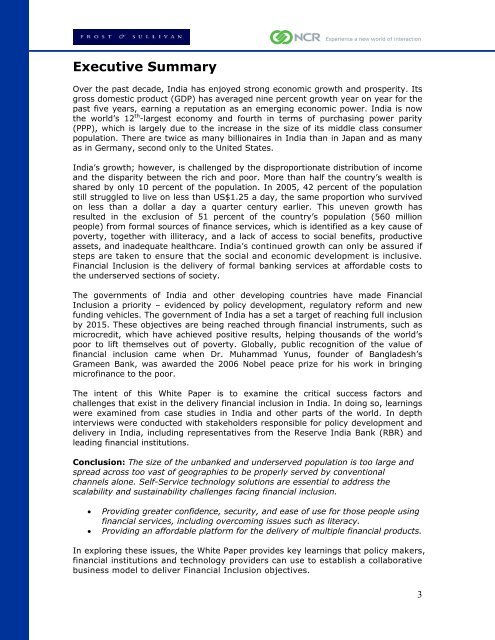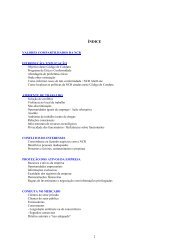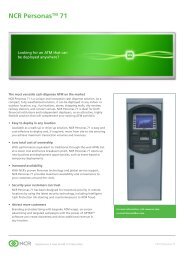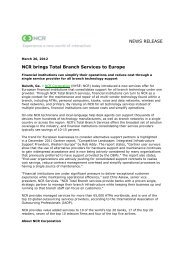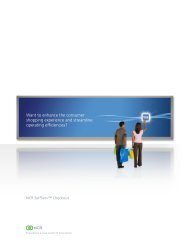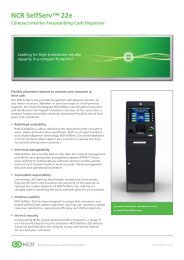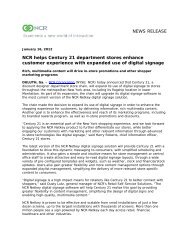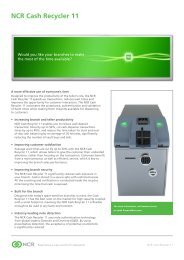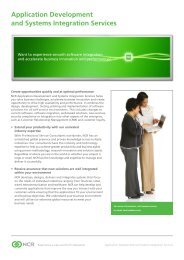Financial Inclusion White Paper - NCR
Financial Inclusion White Paper - NCR
Financial Inclusion White Paper - NCR
Create successful ePaper yourself
Turn your PDF publications into a flip-book with our unique Google optimized e-Paper software.
Executive Summary<br />
Over the past decade, India has enjoyed strong economic growth and prosperity. Its<br />
gross domestic product (GDP) has averaged nine percent growth year on year for the<br />
past five years, earning a reputation as an emerging economic power. India is now<br />
the world’s 12 th -largest economy and fourth in terms of purchasing power parity<br />
(PPP), which is largely due to the increase in the size of its middle class consumer<br />
population. There are twice as many billionaires in India than in Japan and as many<br />
as in Germany, second only to the United States.<br />
India’s growth; however, is challenged by the disproportionate distribution of income<br />
and the disparity between the rich and poor. More than half the country’s wealth is<br />
shared by only 10 percent of the population. In 2005, 42 percent of the population<br />
still struggled to live on less than US$1.25 a day, the same proportion who survived<br />
on less than a dollar a day a quarter century earlier. This uneven growth has<br />
resulted in the exclusion of 51 percent of the country’s population (560 million<br />
people) from formal sources of finance services, which is identified as a key cause of<br />
poverty, together with illiteracy, and a lack of access to social benefits, productive<br />
assets, and inadequate healthcare. India’s continued growth can only be assured if<br />
steps are taken to ensure that the social and economic development is inclusive.<br />
<strong>Financial</strong> <strong>Inclusion</strong> is the delivery of formal banking services at affordable costs to<br />
the underserved sections of society.<br />
The governments of India and other developing countries have made <strong>Financial</strong><br />
<strong>Inclusion</strong> a priority – evidenced by policy development, regulatory reform and new<br />
funding vehicles. The government of India has a set a target of reaching full inclusion<br />
by 2015. These objectives are being reached through financial instruments, such as<br />
microcredit, which have achieved positive results, helping thousands of the world’s<br />
poor to lift themselves out of poverty. Globally, public recognition of the value of<br />
financial inclusion came when Dr. Muhammad Yunus, founder of Bangladesh’s<br />
Grameen Bank, was awarded the 2006 Nobel peace prize for his work in bringing<br />
microfinance to the poor.<br />
The intent of this <strong>White</strong> <strong>Paper</strong> is to examine the critical success factors and<br />
challenges that exist in the delivery financial inclusion in India. In doing so, learnings<br />
were examined from case studies in India and other parts of the world. In depth<br />
interviews were conducted with stakeholders responsible for policy development and<br />
delivery in India, including representatives from the Reserve India Bank (RBR) and<br />
leading financial institutions.<br />
Conclusion: The size of the unbanked and underserved population is too large and<br />
spread across too vast of geographies to be properly served by conventional<br />
channels alone. Self-Service technology solutions are essential to address the<br />
scalability and sustainability challenges facing financial inclusion.<br />
• Providing greater confidence, security, and ease of use for those people using<br />
financial services, including overcoming issues such as literacy.<br />
• Providing an affordable platform for the delivery of multiple financial products.<br />
In exploring these issues, the <strong>White</strong> <strong>Paper</strong> provides key learnings that policy makers,<br />
financial institutions and technology providers can use to establish a collaborative<br />
business model to deliver <strong>Financial</strong> <strong>Inclusion</strong> objectives.<br />
3


